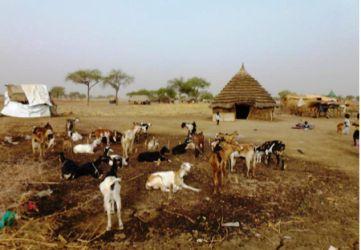South Sudan’s Biong to visit Abyei displaced as political impasse continues
By Ngor Arol Garang
April 8, 2012 (JUBA) – The Co-Chair of the Abyei Joint Oversight Committee (AJOC), Luka Biong Deng, will Monday undertake a field visit to areas hosting displaced people from the contested region on the north-south border to assess the humanitarian situation.

A report from the UN Office for the Coordination of Humanitarian Affairs in late March said that the ‘majority of the people remain displaced in and outside the Abyei area with the bulk of humanitarian assistance being provided by South Sudan humanitarian partners.’
Food distribution in Warrap State has been ‘subject to several obstacles, including incidents of fighting and cattle raiding as well as a shortage of food commodities’, the weekly humanitarian briefing said.
‘The lack of a civilian Abyei Administration, the continued presence of security forces and the existence of landmines continue to inhibit significant returns.’
The impasse over Abyei began when a self determination referendum due for January 2011 did not go-ahead as the two sides could not agree on who was eligible to vote. The referendum is unlikely to take place in the foreseeable future.
Biong, a native of the region told Sudan Tribune he would travel on Monday to the areas hosting those displaced from the conflict.
“I will visit the areas hosting our internally displaced person[s] tomorrow. I will go to Warrap and Bentiu”, Biong said explaining that most of the people have returned to their homes but require immediate humanitarian assistance in term of food, shelter and medical care.
Biong served as the cabinet affairs minister in the the power sharing government – between the south’s SPLM and Khartom’s NCP – that lasted for six years until South Sudan seceded in July last year – a month after SAF took control of Abyei.
In June 2011 South Sudan and Sudan a temporary agreement for the administration and security of Abyei was signed in Addis Ababa on 20 June 2011, calling for SAF and SPLA troops in the area be replaced by a United Nations force comprised of Ethiopian peacekeepers.
The United Nations Interim Security Force in Abyei (UNISFA) has a Chapter VII mandate from the UN Security Council but a Status of Forces Agreement has not been signed by Khartoum, severely restricting the effectiveness of the mission despite it approaching full deployment.
UNISFA reported to the UN Security Council in March that both sides had retained ‘unauthorized armed forces in the Abyei Area, in violation of the 20 June 2011 Agreement’.
The situation remains tense with the ongoing large-scale migration of northern Misseriya nomads into the region with their cattle and the return of around 3,000 displaced Ngok Dinka in the past two months.
Edward Lino Wuor Abyei, a chair of the South Sudan’s ruling Sudan People’s Liberation Movement (SPLM) in the area told Sudan Tribune that the armed forces and police of the Government of the Sudan remained present in the area north of the Kiir/Bahr el-Arab River, especially in Abyei town, Goli, Baloom and the Diffra area.
“The Government of the Sudan continued to link the redeployment of its forces to the establishment of the Abyei Area Administration”, said Lino. The Abyei Joint Committee, which Biong co-chairs, has met three times since September but the two sides have remained deadlocked over the forming a civilian administration for the area just as they were for creating the body to oversee the much delayed referendum.
“The South Sudan Police Service maintained its presence in the entire area south of the Kiir/Bahr el-Arab River, concentrating mainly on the Agok, Majbon, Awang and Mabok area. The Sudan People’s Liberation Army (SPLA) continued to maintain its brigade headquarters in Mijan Kol, approximately 3km south of Agok and the Abyei Area boundary”, he explained.
Biong’s visit comes as Baroness Caroline Cox, an independent member of the upper house of the UK parliament, is due to visit the region over the next week to assess humanitarian situation and raise awareness plight of those displaced by the conflict and the political inertia on the Abyei issue.
(ST)
